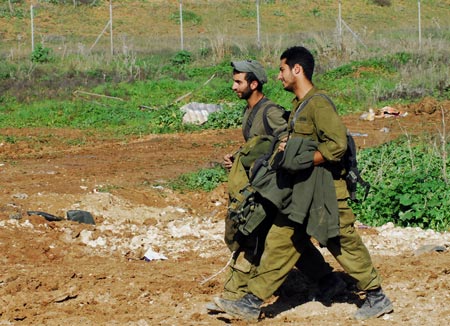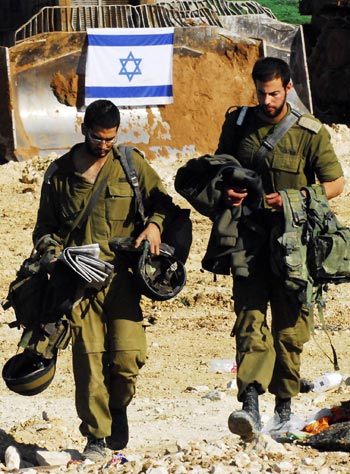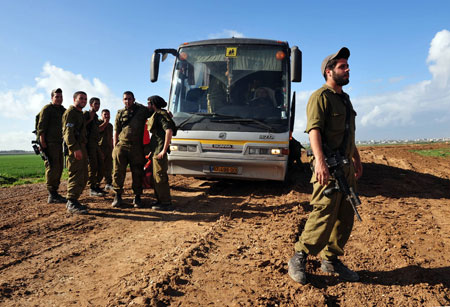Israeli Prime Minister Ehud Olmert said Sunday that his nation will pull troops out of the Gaza Strip once a stable truce is guaranteed.
"We intend to leave Gaza as soon as possible once we make sure that Israel's south is safe. We did not set out to take Gaza, and we have no desire to stay in it," he told visiting European leaders in the evening at his official residence.
 |
|
Israeli soldiers walk on Israel-Gaza border after returning from the Gaza Strip Jan. 18, 2009. The Israeli army has begun withdrawing its troops from the Gaza Strip on Sunday evening, local news service Ynet reported. [Rafael Ben-Ari/Xinhua] |
It is still unknown how many troops Israel will withdraw at the current stage and when it will finish a complete withdrawal. Local news service Ynet reported that the departing troops were deployed to areas near the security fence along the border.
The partial withdrawal came hours after Hamas and other Gazan militant groups announced that they would stage a one-week ceasefire with Israel in the Gaza Strip, during which Israel must withdraw its troops. The Jewish state has put on a unilateral truce since 2 a.m. (0000 GMT), during which Israeli forces are supposed to cease unprovoked fire.
Israeli soldiers walk on Israel-Gaza border after returning from the Gaza Strip Jan. 18, 2009. [Rafael Ben-Ari/Xinhua]
When declaring the unilateral truce on Saturday night, Israeli Prime Minister Ehud Olmert said that the Israeli army would remain in Gaza, and that Israel will consider the withdrawal if Hamas entirely ends its rocket fire.
The ceasefire is "fragile," and Israel will closely monitor the Gaza situation and are ready to handle any scenario, Olmert told his ministers on Sunday morning, stressing that Israel has the right to "react and renew its military actions if the terror groups continue firing."
Israeli soldiers wait to go back by bus at Israel-Gaza border after returning from the Gaza Strip Jan. 18, 2009. [Rafael Ben-Ari/Xinhua]
 |
|
Israeli soldiers walk on Israel-Gaza border after returning from the Gaza Strip Jan. 18, 2009.[Rafael Ben-Ari/Xinhua] |
The partial withdraw followed an announcement from Hamas and other Gazan militant groups that they would stage a one-week ceasefire with Israel, during which Israel must withdraw its troops.
However, officials of the Jewish state, which has put on a unilateral truce since 0200 a.m. Sunday (2400 GMT, Saturday), rebuffed calls for a timetable of withdrawal, stressing that Israel will consider the issue only after it is sure that the ceasefire will hold.
 |
|
Israeli soldiers wait to go back by bus at Israel-Gaza border after returning from the Gaza Strip Jan. 18, 2009.[Rafael Ben-Ari/Xinhua] |
Should a respite be in place, it would bring a pause to the three weeks of bloodshed across the Israel-Gaza border, and pave the way for a possible lasting truce deal between the Jewish state and the Islamist movement in light of the intensifying international mediation efforts.
More than 1,300 Gazans have been killed and over 5,500 wounded in Israel's massive onslaught, dubbed Operation Cast Lead, and 13 Israelis have also died.
(Xinhua News Agency January 19, 2009)